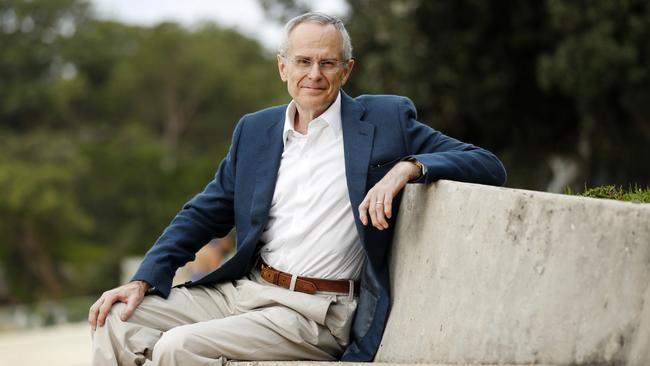Rod Sims sets up Australian Competition and Consumer Commission for the next boss Gina Cass-Gottlieb
ACCC chair Rod Sims is staying busy as he prepares to pass the baton to Gina Cass-Gottlieb in the autumn.

Business
Don't miss out on the headlines from Business. Followed categories will be added to My News.
Outgoing ACCC boss Rod Sims has opted for a business as usual finish to his 11-year term which concludes on March 18 with no plans for a “big bang’’ exit.
Staff are being told to proceed as normal before Sims’s replacement, Gina Cass-Gottlieb, assumes the role on March 20.
Enforcement boss Liza Carver starts in the beginning of March in an era where lawyers are taking control, with former King & Wood Mallesons partner Stephen Ridgeway in the job already as mergers commissioner.
Sims is yet to unveil his next position, but is likely to stay in the public debate with speculation of an academic appointment when he steps down in two months.
Unfinished business includes backing his reforms, which include new merger laws so the companies have the onus of showing why their deal should pass, unfair practice and unsafe goods prescriptions in the law and new controls on infrastructure pricing to include stand-alone assets such as ports and airports giving users the ability to challenge charges.

Cass-Gottlieb has already cleared the hurdle of gaining state approval, but just where the highly credentialed lawyer stands on key issues is not yet known, opening the door for a new era after Sims’s successful 11-year reign.
Sims is awaiting some key judgments, including the BlueScope criminal cartel case alleging attempted price-fixing, and potentially new matters may be launched.
New merger investigations are running strong, including Virgin owner Bain’s deal to buy the old Ansett flight simulator used to train pilots, the $8.2bn international chemical merger between Sika and MBCC, and the potential consolidation of Victorian ports with Spirit Super and Palisade Investments bidding for the Port of Geelong.
Sims also has another regular gas update to be released next month along with an issues paper on plans to introduce new rules allowing the ACCC to intervene before digital platforms expand through new acquisitions.
Digital platforms have been a real reform focus for Sims, but apart from the media bargaining code it has been more through well researched issues paper with minimal litigation.
This comes as the big-five US tech firms – Alphabet (Google), Amazon, Apple, Meta and Microsoft – are stepping up investment to stay in the game with a combined $US280bn ($389bn), or 9 per cent of all US investment last year, up from 4 per cent five years ago.
Typically, technology firms lose power due to changes in technology rather than regulatory action, but the latter is increasing rapidly around the world – from China to South Korea to Europe and the US.
The Sims-led ACCC has been a lead contributor in the international debate, less so in the courtroom.
Cass-Gottlieb’s most recent public entry into policy debate was seven years ago on behalf of Wesfarmers in its unsuccessful campaign to block changes to the abuse of market power provision section 46.
It remains to be seen, once in the new job, what side of the debate she joins as the US is fast moving away from the prevailing so-called consumer welfare standard, which basically said if the merger doesn’t hurt consumers then its OK.
The villains today, like Google, don’t charge consumers for searches and Amazon’s market place is open, but US regulators want to declare both essential to business, which means Google and Amazon would be regulated and potentially banned from owning players in the market.
US FTC boss Lina Khan She argued: “As consumers, as users, we love these tech companies. But as citizens, as workers and as entrepreneurs, we recognise that their power is troubling. We need a new framework, a new vocabulary, for how to assess and address their dominance.”
That is the view of a 32-year regulator in the US. The stage is now set for a seasoned career, big-business lawyer in Cass-Gottlieb to place her credentials as a regulator on the table.
Vulcan dual-listing
BHP shareholders have agreed to consolidate its listing in Australia just as Perth-based lithium producer Vulcan Energy prepares to dual-list on the Frankfurt Stock Exchange early next month.
The $5.2bn producer is effectively based in Germany, where 90 per cent of its staff reside and where its project is situated, so the move makes sense while opening the door to a wider group of shareholders for the $5.2bn company.
Parsons’ warning
Fund manager Andrew Parsons is clear that “you either believe in ESG or you don’t”, and if you do, don’t support the Home Co bid for Aventus, which is due to be considered on Tuesday.
This said, early feedback suggests the deal will receive shareholder approval, not surprisingly good news for deal insiders Brett Blundy and David Di Pilla.
Parsons’ objections include the fact that Blundy pocketed $142m in 2015 when Aventus shareholders agreed to scrap its externally managed model and buy his management rights, and now the company is now turning the clock back to be an externally managed vehicle again.
This time it will be Di Pillar at the honey jar pocketing the fees.
The bidding vehicle Home Co Daily Needs was spun out by Di Pillar from Home Co to create a classically conflicted model in which Home is the external manager and 22 per cent shareholder.
Under the Aventus deal, Home Co will be the beneficiary of annual management fees, among others, of more than $22m a year.
The industry debated the merits of internal and external management last century, but as in all things on the bourse the world works in cycles and entrepreneurs such as Di Pilla have taken the chance to open up the fee box one more time.
Aventus has also been a handy vehicle for Blundy given it was listed in 2015 for $686m and even after recent falls is now worth $1.8bn. He sold 5 per cent of the company in July for $91m, or $3.18 a share, and has struck a deal with Di Pilla to sell another 6 per cent into the deal at $3.40 a share (against Friday’s close of $3.22 a share), so the retail company has proved a handy source of funds for the billionaire.
Shareholders who vote for the deal on Tuesday will be giving away the same management rights they paid $142m for six years ago and, due to the fall in property stocks since the deal was unveiled in November, at a lower price than Blundy received for part of his stake and at a lower price than the scrip deal was struck in November.
Lucky for Home Co and its 14 per cent owner Di Pillar it collects a range of fees, including investment management fees, lease fees, acquisition fees and development fees.
Di Pilla has clearly performed superbly since acquiring the old Masters stores from Woolworths in 2016 to create a growing cash cow and empire, and Blundy gets to continue his liquidation.
He will own 10 per cent of the combined vehicle and will find it easier to sell down than from his 22 per cent stake in Aventus.
The question for shareholders is whether they will enjoy the same benefits under a classically conflicted model.



